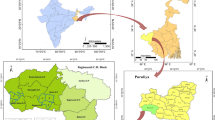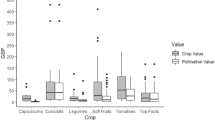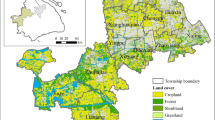Abstract
Adverse conditions in weather, economy and diseases are perceived universally leading to the global food-insecurity. Homegardens could play a crucial role in building resilience at the household level to cope with these extremities to minimize food-insecurity. Since homegardens in the existing forms are not efficiently utilized in this regard, identify hindering factors and overcome them are vital. In this context, two administrative districts in Sri Lanka, Matale and Jaffna were selected as cases having diversified and unique homegardens, respectively, and K-means cluster analyses were performed to group homegardens. The variables important for grouping homegardens were identified through discriminant function analysis. The characteristics of the identified variables were used to differentiate groups of homegardens, where those groups in the two districts could be described by socio-economic and ecological variables. The mean annual income of better groups of homegardens in Matale and Jaffna was 39,341 LKR and 31,609 LKR, respectively. Results revealed that the common factors that hinder efficient utilization of homegardens in two districts were insufficient amounts of food sources, lack of productive and income-generating trees species, inability to incorporate annual and perennial crops without altering existing environment, absence of poultry or livestock, labor shortage, low investment and insufficient technical knowledge on farming. Accordingly, households interacted with homegardens at varying levels of absorptive and adaptive capacities in building resilience. Therefore, consideration of correct blend of floral and faunal components and the variables that strengthen the capacity and efficiency of homegardens to cope with extreme situations is a key to minimize food-insecurity.


Similar content being viewed by others
Data availability
The datasets generated during and/or analyzed during the current study are available from the corresponding author on reasonable request.
Code availability
The codes used and generated during the current study are available from the corresponding author on reasonable request.
References
Abebe T (2005) Diversity in homegarden agroforestry systems of Southern Ethiopia. Tropical resource management Papers, No.59; ISBN 90-6754-901-0
Asmamaw M, Mereta ST, Ambelu A (2019) Exploring households’ resilience to climate change-induced shocks using Climate Resilience Index in Dinki watershed, central highlands of Ethiopia. PLoS ONE 14(7):e0219393
Aungkulanon S, Tangcharoensathien V, Shibuya K, Bundhamcharoen K, Chongsuvivatwong V (2017) Area-level socioeconomic deprivation and mortality differentials in Thailand: results from principal component analysis and cluster analysis. Int J Equity Health 16(1):1–12
Balasankar V, Penumatsa SSV, Vital TPR (2021) Empirical statistical analysis and cluster studies on socio-economic status (SES) dataset. IOP Conf Series: Mater Sci Eng 1085(1):012030. https://doi.org/10.1088/1757-899X/1085/1/012030
Brauksa I (2013) Use of cluster analysis in exploring economic indicator. Differences among regions: the case of Latvia. J Econ, Bus Manag 1(1):42–45
Corley J, Okely JA, Taylor AM, Page D, Welstead M, Skarabela B et al (2021) Home garden use during COVID-19: associations with physical and mental wellbeing in older adults. J Environ Psychol 73:101545
Daulagala C, Weerahewa J, Marambe B, Pushpakumara G, Silva P, Punyawardena R, Premalal S, Miah G, Joy R, Jana S (2013) Socio-economic characteristics of farmers influencing adaptation to climate change: empirical results from selected homegardens in South Asia with emphasis on commercial orientation. Sri Lanka J Adv Social Stud 2(2):71–90
Davis JR, Brownson RC, Garcia R (1992) Family pesticide use in the home, garden, orchard, and yard. Arch Environ Contam Toxicol 22:260–266
d’Errico M, Di Giuseppe S (2018) Resilience mobility in Uganda: a dynamic analysis. World Dev 104:78–96
Fernandes EC, Nair PR (1986) An evaluation of the structure and function of tropical homegardens. Agric Syst 21(4):279–310
Galhena DH, Freed R, Maredia KM (2013) Home gardens: a promising approach to enhance household food security and wellbeing. Agric Food Secur 2(1):1–13
IPCC (2014) Climate Change 2014: Synthesis Report. Contribution of Working Groups I, II and III to the Fifth Assessment Report of the Intergovernmental Panel on Climate Change [Core Writing Team, Pachauri RK, Meyer LA (eds)]. IPCC, Geneva, Switzerland, pp. 151
Korale-Gedara P, Weerahewa J, Pushpakumara G, Kodithuwakku S (2012) Commercial orientation and its effects on plant diversity in homegardens: an empirical investigation of rural households in Sri Lanka. Sri Lankan J Agricult Econ 14:17. https://doi.org/10.4038/sjae.v14i0.4600
Lal R (2020) Home gardening and urban agriculture for advancing food and nutritional security in response to the COVID-19 pandemic. Food Security 12(4):871–876
Lindara LMJK, Johnsen FH, Gunatilake HM (2006) Technical efficiency in the spice based agroforestry sector in Matale district. Sri Lanka Agrofor Syst 68(3):221–230
Liu Q, Xu P, Yan K, Guo Y (2019) Pollination services from insects in homegardens in the Chengdu Plain will be confronted with crises. Sustainability 11(7):2169
Lowe WA, Sinniah J, Jeyavanan K, Silva GLLP, Pushpakumara DKNG (2021) ‘Can homegardens assist in enhancing the domestic food security?’ A study in Jaffna Peninsula. Sri Lanka Agrofor Syst 95(6):1205–1216. https://doi.org/10.1007/s10457-021-00647-1
Lowe WAM, Silva GLLP, Pushpakumara DKNG (2022) Homegardens as a modern carbon storage: assessment of tree diversity and above-ground biomass of homegardens in Matale district, Sri Lanka. Urban Forest Urban Green 74:127671
LUPPD (2020a) Data and information of homegardens in Matale district. Land Use Policy Planning Department, Ministry of Lands and Land Development. Available at https://luppd.gov.lk/images/Matale_District_compressed.pdf
LUPPD (2020b) Data and information of homegardens in Jaffna district. Land Use Policy Planning Department, Ministry of Lands and Land Development. Available at https://luppd.gov.lk/images/Jaffna_District_compressed.pdf
Marambe B, Weerahewa J, Pushpakumara G, Silva P, Punyawardena R, Premalal S, Miah G, Joy R, Jana S (2010) Vulnerability of homegarden systems to climate change and its impact on food security in south Asia. Final Report submitted to Asia-Pacific Network for Global Change Research. Retrieved February 28, 2021 from https://www.apn-gcr.org/archive-resources/files/original/3ddf57b875774091a38f95bdfee0b6c9.pdf
Mardaneh KK (2016) Functional specialisation and socio-economic factors in population change: a clustering study in non-metropolitan Australia. Urban Stud 53(8):1591–1616
Mattsson E, Ostwald M, Nissanka SP, Pushpakumara DKNG (2015) Quantification of carbon stock and tree diversity of homegardens in a dry zone area of Moneragala district, Sri Lanka. Agrofor Syst 89:435–445
Mekuyie M, Jordaan A, Melka Y (2018) Understanding resilience of pastoralists to climate change and variability in the Southern Afar Region, Ethiopia. Clim Risk Manag 20:64–77
Montefrio MJF (2020) Interrogating the “productive” home gardener in a time of pandemic lockdown in the Philippines. Food and Foodways 28(3):216–225. https://doi.org/10.1080/07409710.2020.1790142
Pushpakumara DKNG, Wijesekara A, Hunter DG (2010) Kandyan homegardens: A promising land management system in Sri Lanka. In: Belair C, Ichikawa K, Wong BYL, Mulongoy KJ (eds) Sustainable use of biological diversity in socio-ecological production landscapes, Background to the ‘Satoyama Initiative for the benefit of biodiversity and human well-being. Secretariat of the Convention on Biological Diversity, Montreal, Canada, pp 102–108
Pushpakumara DKNG, Marambe B, Silva GLLP, Weerahewa J, Punyawardena BVR (2012) A review of research on homegardens in Sri Lanka: the status, importance and future perspective. Trop Agricult 160:55–125
Pushpakumara G, Sokolow J, Sthapit B, Sujarwo W, Hunter D (2021) Keeping it close to home: homegardens and biodiversity conservation. Home gardens for improved food security and livelihoods (1st edn). Routledge, Oxfordshire, pp 46–77
Santhoshkumar AV, Ichikawa K (2010) Homegardens: sustainable land use systems in Wayanad, Kerala, India. In: Sustainable Use of Biological Diversity in Socio-ecological Production Landscapes, vol 52, p125
Rasooldeen, M. (2022, June 3). Sri Lanka wants people to grow food at home as shortage looms. Arab news. https://arab.news/nhd4j
Rosenblatt M (1956) Remarks on some nonparametric estimates of a density function. Ann Math Stat 27:832–837. https://doi.org/10.1214/aoms/1177728190
Tambo JA (2016) Adaptation and resilience to climate change and variability in North–East Ghana. Int J Disaster Risk Red 17:85–94
Walker B, Holling CS, Carpenter SR, Kinzig A (2004) Resilience, adaptability and transformability in social–ecological systems. Ecology Soci 9(2):9
Weerahewa J, Pushpakumara G, Silva P, Daulagala C, Punyawardena R, Premalal S, Miah G, Roy J, Jana S, Marambe B (2012) Are homegarden ecosystems resilient to climatic change? An analysis of adaptation strategies of homegardeners in Sri Lanka. APN Sci Bull 2(1):22–27. https://doi.org/10.30852/sb.2012.22
Funding
The study was funded by the National Science Foundation. Sri Lanka. Grant Number; NTRP/217/CC&ND/TA-04/P-02/01.
Author information
Authors and Affiliations
Contributions
NK, LS, GP and PS (all authors) contribute to the conceptualization of the research; NK and LS Developed the methodology and formal analysis; Investigation, Software, Visualization and Writing–Original Draft were performed by NK; LS, GP and PS did the Writing–Review & Editing; Providing Resources, Supervision, Project administration and Funding Acquisition were related with PS. All authors read and approved the final manuscript.”
Corresponding author
Ethics declarations
Conflict of interest
The authors declare that they have no known competing financial interests or personal relationships that could have appeared to influence the work reported in this paper.
Ethical approval
Not required.
Consent to participate
Informed consent was obtained from all individual participants included in the study.
Consent for publication
The authors affirm that human research participants provided informed consent for publication of their data.
Additional information
Publisher's Note
Springer Nature remains neutral with regard to jurisdictional claims in published maps and institutional affiliations.
Rights and permissions
Springer Nature or its licensor (e.g. a society or other partner) holds exclusive rights to this article under a publishing agreement with the author(s) or other rightsholder(s); author self-archiving of the accepted manuscript version of this article is solely governed by the terms of such publishing agreement and applicable law.
About this article
Cite this article
Kuruppuarachchi, N., Suriyagoda, L.D.B., Silva, G.L.L.P. et al. Identification of gaps in homegardens in coping with household resilience. Agroforest Syst 98, 323–336 (2024). https://doi.org/10.1007/s10457-023-00911-6
Received:
Accepted:
Published:
Issue Date:
DOI: https://doi.org/10.1007/s10457-023-00911-6




